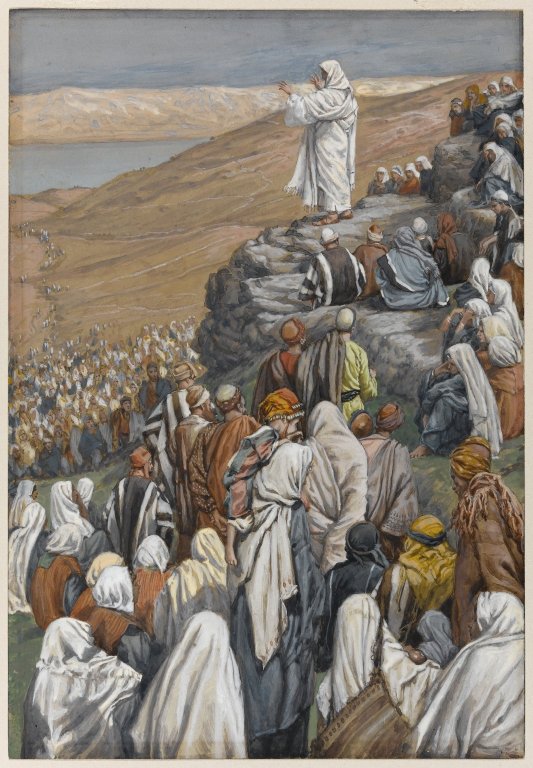For the rest of this season of Lent, I’m going to mostly let the readings speak for themselves and instead spend some time on the Lord’s Prayer. This prayer is a part of daily public worship in the church and it is a fixture of home devotions as well. Along with the Ten Commandments and the Creed, it is part of what we call the Catechism, that is the basic instructions for people coming into the faith. It can be learned by heart from a young age and relied upon over and over again, as often as you need it. God never gets tired of hearing these words. If you do not pray this prayer every day, I encourage you to start right away. It’s part of my morning devotions every day, and it’s the prayer I say with my children at bedtime. And it’s a prayer at hand any time I need to pray but can’t think of what to ask for or how.
We call it the Lord’s Prayer because it is given to us directly by Jesus. It appears in Matthew’s and Luke’s account of the Gospel. In Matthew, it appears in the Sermon on the Mount, when Jesus says not to pray by heaping up empty words. In Luke, Jesus offers it when he is asked “Lord, teach us how to pray.” And it also appears in an ancient Christian text called the Didache, or Teaching of the Twelve Apostles. This source may be older than some of the books of the New Testament. And in the Didache, the prayer appears with no reference to Jesus teaching it. It is simply presented as the way Christians should pray. Our Catholic and Orthodox brothers and sisters call it the Our Father, from its first words.
So this prayer is exemplary. It sums up in a few words what prayer is supposed to be for us. Jesus famously tells his followers not to heap up words in vain, but to pray simply, directly, and even in secret.
So let’s hear the first petition of the prayer: Our Father, who art in heaven, hallowed be thy name.
The first thing to note here is that Jesus tells us to address God as Father. In the history and theology of the Church, “Father” becomes identified with God’s role as wrathful judge. But in the Gospels, this term is meant to encourage us to approach God with confidence and love rather than dread. “Which of you, if your child asks for bread, would give him a stone?” Jesus asks, saying that God is still more willing to give us what we need.
And this takes away a common barrier to prayer: the belief that we are somehow not worthy or rightly prepared to ask God for anything good. “We allow ourselves to be impeded and deterred by such thoughts as these,” Martin Luther wrote. ““I am not holy enough or worthy enough; if I were as righteous and holy as St. Peter or St. Paul, then I would pray.” Away with such thoughts! The very commandment that applied to St. Paul applies also to me.” Our prayers are holy and acceptable if they are earnest, not if we ourselves have become holy enough for God to listen to. While I can tolerate all kinds of irreverence, to this day I find the idea of praying ironically or without meaning it to be very frightening. Our earnestness vouches for our prayer.
It can be hard to expect good things from God. I know how useless prayer can feel. But if we imagine God as a loving parent who wants to be asked for good things, simply and honestly, we don’t need to feel any inhibition.
The second thing to note in these words is that we ask that God’s name be hallowed. We might say instead “may your name be holy.” This is Jesus speaking in a traditional Jewish manner, in which God is only ever mentioned with a blessing.
And of course, God’s name is already holy: YHWH, I am what I am. It is a name powerful in itself, so powerful that in pious Jewish tradition it is not written or spoken except on the most solemn occasions. We cannot actually make God’s name any more holy than it already is.
But we pray “hallowed be thy name” so that God’s name may be made and kept holy among us and for us. This is a way of saying “God, make your name holy and precious and sacred to me and to the world.” We do this when we call on God for our needs, when we use God’s name to bless, when we honor God in our words and actions. And we fail to do this when we neglect to call on God, when we use God’s name to curse or deceive, and when we fail to honor God in our words and actions.
And this is part of the power of this prayer. This is why this first bit is so important. We may have no spiritual feeling. We may wake up and go through our day and go to bed without any sense that we are part of an eternal, divine economy with the source of all creation. We may not even be in the mood to ask God for anything we need. We may be embarrassed that we need it. But we can always offer this prayer up to God. It is there for you, all the time, whenever you need it. God, allow me to speak to you as I would to a loving father or mother. God, may I keep your name holy today. May it, and you, be precious to me above all the things you have made. In this, the prayer contains its own answer. Amen.


 RSS Feed
RSS Feed